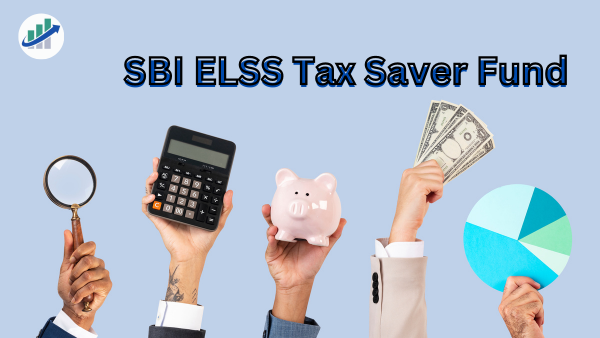Introduction
In the world of finance, investing has been made simple and beneficial with the introduction of the SBI ELSS Tax Saver Fund. It balances both the prospects of investing, one being the profits and the other being the tax relaxation. This scheme is specifically designed to offer tax relief to investors. It provides multiple benefits under section 80 C of income tax.
Let’s look into the SBI ELSS fund in more detail. This fund belongs to the Equity ELSS category and has been generating returns of 12.27% since it was launched on 31st March 1993. Being an open-ended scheme, it gives investors the flexibility to buy and sell the units of the fund at any time. As of 29th February 2024, the AUM (Asset Under Management) of the fund stood at an impressive 21,202.78 Cr, indicating the trust and confidence the investors have in the fund managers.
In this article, we will discuss in detail the investing pattern of this fund scheme. Identifying the ways of investment and the key features of the SBI ELSS Scheme. Let us start the analysis.
What is the ELSS Category?
In India, there exists a special investment method known as the Equity Linked Savings Scheme (ELSS). It’s crafted to assist individuals in saving on taxes while simultaneously growing their wealth. Therefore, two benefits are provided within a single plan.
Money is invested in the stock market by ELSS. This means the purchase of shares from various companies. The potential for quicker growth of money compared to other alternatives like maintaining it in a savings account or fixed deposit is offered by the stock market.
An important aspect to note about ELSS is that once money is invested, it cannot be withdrawn for a minimum of three years. This duration is referred to as a lock-in period. Although it may appear lengthy, it’s beneficial as it encourages a long-term perspective. The adage “good things come to those who wait” might have been heard by you, and its validity applies here. By remaining invested for an extended period, more opportunity is provided for investments to grow.
ELSS is a suitable option for investors seeking to save on taxes while also desiring long-term growth of their money. It’s similar to planting a tree and observing its gradual growth and strengthening with each passing year. Consequently, if one’s willing to exercise patience and contemplate your future, ELSS could prove to be a prudent choice for you.
In summary, ELSS stands as a distinctive investment scheme in India aimed at aiding individuals in tax savings and wealth enhancement. Investor’s money is directed towards the stock market by this scheme, potentially leading to accelerated growth. Despite the inability to withdraw money for three years, this serves to foster a mindset oriented towards long-term gains, thereby benefitting their financial prospects.
Understanding the Investing Style
- The scheme is designed to assist in the growth of your money by investing in various assets such as company shares, preference shares, and convertible bonds.
- This diversified mix of investments is selected to potentially increase the value of your investment over time.
- Initially, there were designated periods during which investors Before November 1999, investors in the scheme were subjected to restrictions, as they were only allowed to deposit or withdraw their funds at specific times.
- However, a change was implemented in November 1999, providing investors greater flexibility.
- They were now able to deposit or withdraw their funds at any time, giving them the freedom to manage their investments according to their individual needs and goals.
- This modification was a significant improvement that allowed investors greater control over their investment decisions.
Features of SBI ELSS Tax Saving Schemes
Lock-in period
ELSS mutual funds have a lock-in term that limits withdrawals of invested funds for a minimum of three years. It offers the benefits of long-term
Equity exposure
Purchasing stocks (shares) of different companies inside these funds account for at least 80% of the investment.
Tax benefits
Under section 80C of the Income Tax Act, an investment in an ELSS is eligible for an income tax deduction, which can lower the amount of tax owed by up to RS 1.5 lakh.
Market-linked returns
The success of the stock market affects the returns from ELSS funds. Investment increases if the businesses in which the fund is invested do successfully. On the other hand, investments might not increase as much if they perform poorly.
Diversified portfolio
Funds are allocated among numerous businesses and sectors within ELSS funds. By providing a balanced total investment performance, the performance of one sector may be counterbalanced by the performance of others, so mitigating risk.
How to invest in SBI ELSS Schemes?
This is a very important step when choosing to invest in Mutual Funds.
Growth option
In this option, there are no progressive dividends. Rather, the growth of an investment happens gradually, and profits are recognized when investors decide to sell. This adds to the growth in the Net Asset Value (NAV), which raises the value of investments overall. It should be remembered that returns are riskier because they depend on how the market performs.
Dividend option
Investors who choose this option will periodically earn dividends. These distributions are comparable to mutual fund bonuses. Understanding that the investor’s income tax bracket determines how much of these profits are taxable is crucial. Furthermore, the mutual fund will withhold a 10% tax from dividends exceeding RS 5,000 before payment.
Dividend reinvestment option
Under this option, investors can decide to have dividends reinvested back into the fund instead of receiving cash. This tactic may prove helpful, especially if the market is trending upward and is trading at a high level. As the NAV rises, there is an opportunity for additional investment growth through the reinvestment of dividends.
Conclusion
To sum up, the SBI ELSS Tax Saver Fund provides an easy and advantageous approach to investing by balancing tax advantages against possible gains. Introduced in 1993, the goal of this Mutual Fund SIP scheme is to help investors grow their money by diversifying into different assets such as bonds and company shares. Investors benefit from tax benefits under section 80C of the Income Tax Act, with a three-year lock-in period. Investors can select among growth, dividend, or dividend reinvestment choices, with the fund’s performance being correlated with the stock market. All things considered, the SBI ELSS category offers investors flexibility, tax advantages, and long-term development potential.



